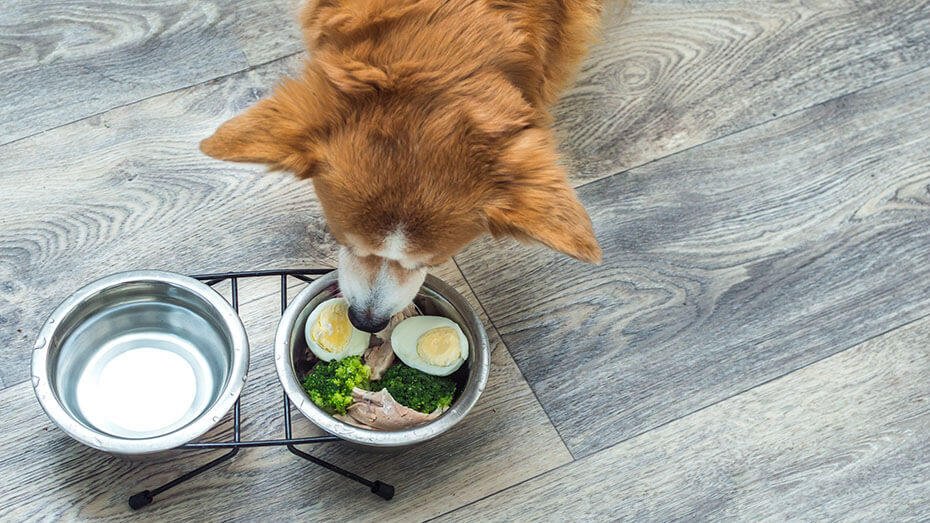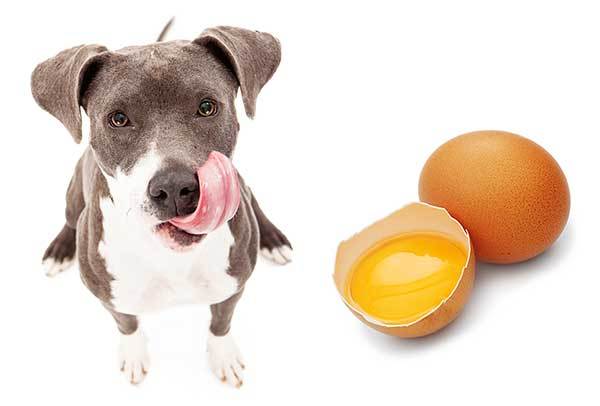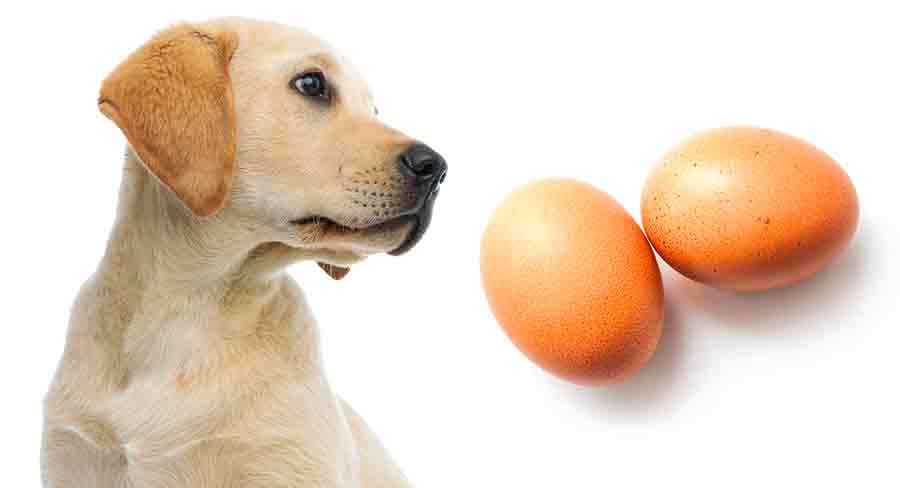Can Dogs Eat Eggs? As one can see, eggs serve as one of the most popular food products that different people tend to consume for breakfast, lunch, or dinner. However, if we had to pick one, it would probably be our four-legged friends. Is it possible for dogs to consume eggs too? And what about the roasted or not argument?
Table of Contents
The solution does not follow as smooth as you may assume. The pros and cons of egg consumption in dogs are being debated as the raw eggs versus cooked eggs arguments for dogs remain unresolved.
In this article, we will discover the nutritional value of eggs for dogs, discuss the benefits and potential risks of feeding eggs to dogs, and present the positive and negative aspects of raw egg diets vs cooked egg diets for dogs. In addition to that, we will supply a few practical advice on how to effectively feed your dog eggs without any danger and when to consult your veterinarians for a piece of advice.
By the end of this, you will have a better understanding of whether dogs can eat eggs, and which option is better for your furry friend: raw or cooked eggs as well.
The Nutritional Value of Eggs for Dogs

Eggs are a rich source of protein, fat, and various vitamins and minerals that are beneficial for dogs’ health. Here are some of the nutrients that eggs provide for dogs, and why they are important:
- Protein: Eggs are one of the most complete sources of protein, containing all nine essential amino acids that dogs need for muscle development and repair. Protein also helps support the immune system, hormone production, and enzyme function in dogs.
- Fat: Eggs contain healthy fats, such as omega-3 fatty acids, that promote a shiny coat and support brain function in dogs. Omega-3 fatty acids also have anti-inflammatory properties that can help reduce joint pain and skin irritation in dogs.
- Vitamin A: Eggs are a good source of vitamin A, which is essential for vision, skin health, and immune system function in dogs. Vitamin A also helps protect the mucous membranes of the eyes, nose, mouth, and throat from infections in dogs.
- Vitamin B12: Eggs are a great source of vitamin B12, which is vital for the production of red blood cells and the maintenance of the nervous system in dogs. Vitamin B12 also helps prevent anemia, a condition that causes weakness and fatigue in dogs.
- Iron: Eggs are a decent source of iron, which is a mineral that helps transport oxygen throughout the body and prevent anemia in dogs. Iron also supports the immune system and the metabolism of dogs.
- Selenium: Eggs are an excellent source of selenium, which is a mineral that acts as an antioxidant and protects the cells from damage caused by free radicals in dogs. Selenium also helps regulate the thyroid function and the immune system in dogs.
As you can see, eggs are a nutritious food that can provide many benefits for dogs’ health. However, eggs are not without their drawbacks. There are also some potential risks that eggs can pose to dogs, especially if they are fed raw or in excess.
Potential Benefits and Risks of Feeding Eggs to Dogs

Feeding eggs to dogs can have both positive and negative effects, depending on the quantity, quality, and preparation method of the eggs. Here are some of the potential benefits and risks of feeding eggs to dogs:
Benefits of Feeding Eggs to Dogs
- Improved Skin Condition: Eggs can help improve the skin condition of dogs, especially those with dry, flaky, or itchy skin. This is because eggs contain fatty acids, vitamin A, and biotin, which are all important for skin health and hydration in dogs. Eggs can also help reduce inflammation and irritation in the skin of dogs, thanks to their omega-3 fatty acids and selenium content (Research).
- Increased Nutrient Absorption: Eggs can help increase the nutrient absorption of dogs, especially those with digestive issues or poor appetite. This is because eggs are highly digestible and contain enzymes that help break down other foods in the digestive tract of dogs. Eggs can also help boost the absorption of fat-soluble vitamins, such as vitamin A, D, E, and K, in dogs, thanks to their fat content.
- Enhanced Immune System: Eggs can help enhance the immune system of dogs, especially those with weakened immunity or prone to infections. This is because eggs contain protein, vitamin A, vitamin B12, iron, and selenium, which are all essential for immune system function and protection in dogs. Eggs can also help fight off bacteria and viruses in the body of dogs, thanks to their lysozyme and immunoglobulin content.
Risks of Feeding Eggs to Dogs
- Allergic Reactions: Eggs can cause allergic reactions in some dogs, especially those with food sensitivities or allergies. The most common allergens in eggs are the egg whites, which contain proteins that can trigger an immune response in dogs. The symptoms of an egg allergy in dogs can include itching, hives, swelling, vomiting, diarrhea, or anaphylaxis. If you notice any of these signs in your dog after feeding them eggs, stop immediately and contact your veterinarian.
- Bacterial Contamination: Eggs can be contaminated with bacteria, such as salmonella, E. coli, or campylobacter, which can cause serious infections in dogs. These bacteria can be present on the eggshell, the egg yolk, or the egg white, and can be transferred to the dog’s mouth, digestive system, or other parts of the body. The symptoms of a bacterial infection in dogs can include fever, lethargy, loss of appetite, vomiting, diarrhea, or dehydration. If you suspect that your dog has ingested a contaminated egg, seek veterinary attention as soon as possible.
- Biotin Deficiency: Eggs can cause biotin deficiency in dogs, especially if they are fed raw eggs or too many eggs. Biotin is a B vitamin that is important for skin, hair, and nail health in dogs. Raw egg whites contain a protein-binding compound called avidin, which can interfere with the absorption of biotin in dogs. Biotin deficiency can lead to skin problems, hair loss, brittle nails, or neurological disorders in dogs. To prevent this, you should either cook the eggs or limit the amount of raw eggs you feed your dog.
As you can see, feeding eggs to dogs can have both benefits and risks, depending on the quantity, quality, and preparation method of the eggs. Therefore, it is important to exercise caution and moderation when feeding eggs to dogs, and consult a veterinarian for guidance.
Raw Eggs Vs Cooked Eggs for Dogs: Which is the Safer Option?

One of the most debated topics among dog owners and experts is whether raw eggs or cooked eggs are better for dogs. There are pros and cons to both options, and the answer may depend on your dog’s individual needs and preferences. Here are some of the main differences between raw eggs and cooked eggs for dogs, and their respective advantages and disadvantages:
Raw Eggs for Dogs
Raw eggs are eggs that have not been cooked or processed in any way. They are usually fed to dogs as part of a raw diet, which consists of raw meat, bones, organs, and other natural foods. Some of the benefits of feeding raw eggs to dogs are:
- More Nutrients: Raw eggs are more nutritious than cooked eggs, as they retain more of their natural vitamins, minerals, enzymes, and antioxidants. Raw eggs also have higher levels of omega-3 fatty acids, which are beneficial for dogs’ health.
- Better Taste: Raw eggs are more palatable than cooked eggs, as they have a fresher and richer flavor. Raw eggs also have a softer and smoother texture, which some dogs may prefer over the hard and dry texture of cooked eggs.
Some of the drawbacks of feeding raw eggs to dogs are:
- Higher Risk of Bacterial Contamination: Raw eggs are more likely to be contaminated with bacteria, such as salmonella, E. coli, or campylobacter, which can cause serious infections in dogs. These bacteria can be present on the eggshell, the egg yolk, or the egg white, and can be transferred to the dog’s mouth, digestive system, or other parts of the body. To reduce this risk, you should only feed your dog fresh and clean eggs from a reputable source, and wash your hands and utensils thoroughly after handling them.
- Higher Risk of Biotin Deficiency: Raw eggs can cause biotin deficiency in dogs, especially if they are fed raw egg whites or too many eggs. Biotin is a B vitamin that is important for skin, hair, and nail health in dogs. Raw egg whites contain a protein-binding compound called avidin, which can interfere with the absorption of biotin in dogs. Biotin deficiency can lead to skin problems, hair loss, brittle nails, or neurological disorders in dogs. To prevent this, you should either cook the eggs or limit the amount of raw eggs you feed your dog.
- Lower Risk of Biotin Deficiency: Cooked eggs are less likely to cause biotin deficiency in dogs, as they have lower levels of avidin, the protein-binding compound that interferes with biotin absorption in dogs. Cooked eggs also have higher levels of biotin, as some of it is released from the egg yolk during the cooking process. Therefore, feeding cooked eggs to dogs can help prevent or treat biotin deficiency and its associated symptoms in dogs.
Some of the drawbacks of feeding cooked eggs to dogs are:
- Less Nutrients: Cooked eggs are less nutritious than raw eggs, as they lose some of their natural vitamins, minerals, enzymes, and antioxidants during the cooking process. Cooked eggs also have lower levels of omega-3 fatty acids, which are beneficial for dogs’ health.
- Less Taste: Cooked eggs are less palatable than raw eggs, as they have a duller and bland flavor. Cooked eggs also have a harder and drier texture, which some dogs may dislike or find difficult to chew.
As you can see, feeding cooked eggs to dogs has its advantages and disadvantages, and the choice may depend on your dog’s individual needs and preferences. However, regardless of whether you choose to feed your dog raw eggs or cooked eggs, there are some general guidelines that you should follow to ensure their safety and nutritional well-being.
Cooked Eggs for Dogs
Cooked eggs are eggs that have been heated or processed in some way, such as boiling, scrambling, frying, or baking. They are usually fed to dogs as a treat, a supplement, or a part of a cooked diet, which consists of cooked meat, grains, vegetables, and other foods. Some of the benefits of feeding cooked eggs to dogs are:
- Lower Risk of Bacterial Contamination: Cooked eggs are safer than raw eggs, as they have been exposed to high temperatures that kill most of the bacteria that can cause infections in dogs. Cooked eggs are also less likely to have bacteria on their shells, as they have been washed and sanitized before being sold.
The risk of salmonella was found to be significantly higher in dogs fed raw eggs.
These bacteria can cause serious illness in dogs (and their owners), but these infections are difficult to treat.
Also Read: Bacterial Pneumonia in Dogs: All you need to know
In addition to food safety issues, there are nutritional issues related to raw eggs. Egg whites contain a protein called avidin, which binds to biotin and B-vitamin.
Biotin is not considered an essential nutrient for dogs, meaning it does not need to be in their diet as dogs can synthesize it themselves.
However, feeding raw eggs induces biotin deficiency because the synthesized biotin binds to avidin and the dog does not use it.
Can dogs eat egg yolks?
Dogs can eat properly cooked egg yolks, but it should be done in proper observation. Egg yolks are very energy-dense (i.e. high in calories) and high in fat, including cholesterol.
In humans, dietary cholesterol has been found to have many negative health effects, although in dogs we do not have the same concerns and cholesterol is well tolerated.

However, dogs’ health conditions can be exacerbated by dietary cholesterol, including lipemia and hypertriglyceridemia (increased levels of fat in the blood) and pancreatitis.
Egg yolks should not be fed, especially in these dogs.
For healthy dogs, the dose of fat and cholesterol from egg yolks may not be harmful, although pet parents should be aware of the risk of triggering pancreatitis.
Some breeds of dogs, including miniature schnauzers and terriers, are at increased risk of pancreatitis.
Can dogs eat cooked eggs?
Feeding cooked eggs to dogs is less dangerous — although it depends on how they are made.
Cooking helps to kill pathogenic bacteria and reduces the risk of Salmonella.
However, cooking does not change the nutritional composition of the eggs and the high fat content is still there.
In addition, if the eggs are fried, the fat added from the oil or butter increases the risk of an adverse reaction.

If eggs are scrambled with extra milk, the risk of causing diarrhea increases as most dogs do not tolerate dairy products well.
If you are interested in feeding your dog cooked eggs, the best way is to boil or scramble without any additives. It is also important to consider the portion size when feeding eggs to dogs.
The average egg contains 75 calories. Dogs should consume a maximum of 10% of their daily energy from incomplete food sources, including eggs.
This means that only dogs over 50 pounds can eat a whole egg a day as part of a balanced diet.
Can dogs eat hard-boiled eggs?
Hard-boiled eggs kill pathogenic bacteria, making it a safer choice for dogs. However, like the section on cooked eggs above, hard-boiled eggs are still high in fat and calories.
This means that dogs are at risk of becoming overweight if they are fed hard-boiled eggs. Hard-boiled eggs should not be given to dogs with health conditions such as triglyceridemia, lipemia, or pancreatitis.
Remember component control. Dogs should not get more than 10 percent of their calories from food additives, including feasts and eggs.
Can dogs eat deviled eggs?
Deviled eggs should not be given to dogs. The added mayonnaise brings in more fat and has no adverse effects.
While a fatty breakfast may not cause pancreatitis, dogs can be affected by other conditions, such as steatorrhea
The excretion of abnormal quantities of fat with the feces owing to reduced absorption of fat by the intestine is steatorrhea.
If your dog has disturbed some devil eggs from counter surfing, keep an eye on them for signs of gastrointestinal upset such as lip smacking, drinking and vomiting.
If you have problems, you can always call your veterinarian.
How often can dogs eat eggs?
There is no really defined frequency for feeding dog eggs. The general recommendation is not to feed more than 10 percent of dog food from feasts, snacks and scraps.
Eggs are high in fat and cholesterol and should be considered as not all dogs process eggs in the same way.
Dogs are individuals and their specific nutritional needs should be considered before adding new food to their diet.
Consult your veterinarian to identify any nutritional issues for your dog.
Alternatively, some specialized veterinary nutritionists can work with you and your dog to make appropriate dietary recommendations tailored to your dog’s needs.
How to Safely Incorporate Eggs into Your Dog’s Diet
If you have decided to include eggs in your dog’s diet, whether raw or cooked, there are some practical tips that you should follow to ensure their safety and nutritional well-being. Here are some of them:
- Introduce Eggs Gradually: Eggs are a new food for your dog, and they may not be used to them. Therefore, you should introduce eggs gradually to your dog’s diet, starting with small amounts and increasing them over time. This will help your dog adjust to the taste and texture of eggs, and prevent any digestive issues or allergic reactions.
- Monitor for Any Adverse Reactions: Eggs can cause adverse reactions in some dogs, such as vomiting, diarrhea, itching, or anaphylaxis. Therefore, you should monitor your dog closely for any signs of discomfort or distress after feeding them eggs. If you notice any of these symptoms, stop feeding eggs to your dog immediately and contact your veterinarian.
- Determine the Appropriate Amount of Eggs to Feed Your Dog: Eggs are a nutritious food, but they are not a complete and balanced diet for your dog. Therefore, you should not feed your dog too many eggs, as this can cause nutritional imbalances or health problems. The appropriate amount of eggs to feed your dog depends on several factors, such as their size, weight, age, activity level, and individual nutritional needs. As a general rule of thumb, you can feed your dog one egg per day, or up to three eggs per week, as a supplement or a treat. However, you should consult your veterinarian for a more specific recommendation based on your dog’s condition and requirements.
Conclusion
Eggs are a common food item that many people enjoy for breakfast, lunch, or dinner. But what about our canine companions? Can dogs eat eggs as well? And if so, should they be raw or cooked?
The answer is not as simple as you might think. There are benefits and risks associated with feeding eggs to dogs, and the debate between raw eggs vs cooked eggs for dogs is ongoing. In this guide, we have explored the nutritional value of eggs for dogs, the potential benefits and risks of feeding eggs to dogs, and the pros and cons of raw eggs vs cooked eggs for dogs. We have also provided some practical tips on how to safely incorporate eggs into your dog’s diet, and when to consult a veterinarian for advice.
By the end of this guide, you should have a better understanding of whether dogs can eat eggs, and which option is better for your furry friend: raw eggs or cooked eggs.
Final Thoughts: While the debate between raw eggs vs cooked eggs for dogs continues, what matters most is maintaining a balanced and diverse diet that meets all of their nutritional needs. Eggs can be a part of that diet, as long as they are fed in moderation and with proper care. Remember to always consult your veterinarian before making any significant changes to your dog’s diet, including the addition of eggs. Your dog’s health and happiness depend on it. 🐶
I hope you found this guide helpful and informative.

